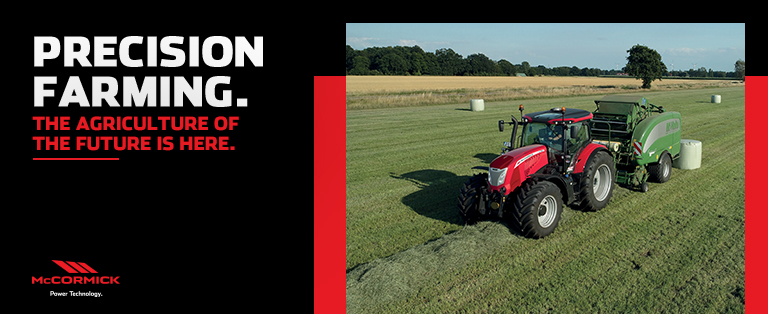PRECISION FARMING, OPTIMISATION AND SUSTAINABILITY: THE AGRICULTURE OF THE FUTURE IS HERE

Table of contents:
Agriculture 4.0, the foundations for a better future
If digital innovation is one of the main features of the change that the agricultural sector has experienced and is experiencing in recent years, the approach that this technology can have in supporting environmental sustainability is an extremely topical issue.
Keeping up with these changes and even anticipating them has always been McCormick’s mission. In the same way, attention to the planet and the well-being of its inhabitants are fundamental aspects in the design of new tractors, which increasingly respond to the needs of farmers who want to increase their productivity while maintaining high quality and respecting the land. This has resulted in the implementation of cutting-edge technologies, which McCormick has already introduced for some time, such as the Isobus – the protocol created to allow agricultural machinery to be connected to each other, the Satellite Assisted Driving – which provides integrated devices and software to support the driver, and the Fleet Management – the telematic system to remotely control the fleet.
Precision Farming: between technology and sustainability
Precision Farming is undoubtedly one of the forerunner and most concrete aspects of Agriculture 4.0, which fits perfectly within this context as it encompasses all those strategies and tools that – thanks to technical innovation and digitisation, hence data collection and analysis – enable optimisation and improvement of productivity by working more sustainably, thus respecting the different needs of specific crops, soils and areas while maintaining a very high level of precision.
The technological development of precision farming supports the interests of the planet, as it allows obtaining high quality and higher production with the least use of resources, while reducing the waste of water as well as fertilisers and herbicides, decreasing CO2 emissions and rationalising the use of tools. Thanks to increasingly cutting-edge technologies that put the health of the soil at the forefront, Precision Farming is constantly evolving. In fact, through the collection of soil data, automated planting and harvesting are now possible.
Optimisation: good for everyone!
Working according to the criteria of smart farming, which makes optimisation of resources its main feature, makes it possible to approach and evolve the model of sustainable intensification: producing more while consuming less. Today farmers face the task of reconciling the ever-increasing demand for products with the need to protect human and environmental resources.
The great advantage is that not only does Precision Farming respond to this dual demand, but the savings in water and fertilisers and the reduction of carbon dioxide affect the soil in terms of quality, guaranteeing a healthy, safe and rich harvest. Precision farming also allows farmers to increase their economic resources and thus invest them in cutting-edge equipment, fuelling this virtuous circle that focuses on productivity, safeguarding the planet and improving the social aspects of agriculture (worker well-being, increased employment, reduced business costs) that we will define as increasingly resilient.
McCormick is a reference point for farmers who look to the future at 360°, with the awareness that intensifying productivity will increasingly go hand in hand with respect for and protection of the environment and people.
